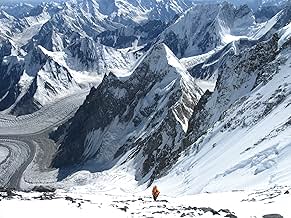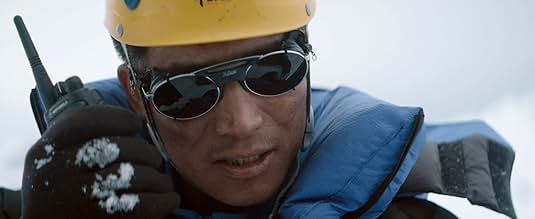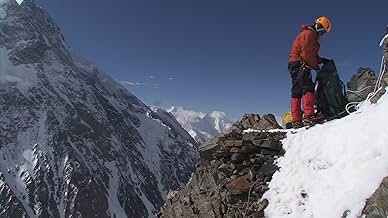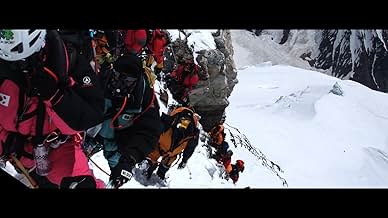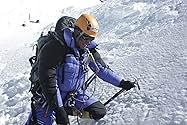IMDb-BEWERTUNG
6,8/10
5634
IHRE BEWERTUNG
Die Geschichte des tödlichsten Tages auf dem gefährlichsten Berg der Welt, als elf Kletterer auf mysteriöse Weise auf dem K11 ums Leben kamen.Die Geschichte des tödlichsten Tages auf dem gefährlichsten Berg der Welt, als elf Kletterer auf mysteriöse Weise auf dem K11 ums Leben kamen.Die Geschichte des tödlichsten Tages auf dem gefährlichsten Berg der Welt, als elf Kletterer auf mysteriöse Weise auf dem K11 ums Leben kamen.
- Auszeichnungen
- 3 Gewinne & 5 Nominierungen insgesamt
Walter Bonatti
- Self
- (Archivfilmmaterial)
Gerard McDonnell
- Self - Climber
- (Archivfilmmaterial)
Hristo Mitzkov
- Marco Confortola
- (as Christo Mitzkov)
Lochlann O'Mearáin
- Ger McDonnell
- (as Lochlainn O'Mearain)
Empfohlene Bewertungen
Confusing and untrue at times. I had to read about what actually happened to find out the facts after 2 hours of poorly put together interviews. Also the Serbian climber was quite selfless and died because he unclipped to let other people pass him, not to pass Skog. I don't know why they would make such a strange mistake on this detail, but it's either deliberate lying to make the story better or poor research.
At 8 a.m. climbers were finally advancing through the Bottleneck. Dren Mandić, from the Serbian team, decided to attend to his oxygen system and so unclipped from the rope to let other climbers pass. Mandić lost his balance and fell, bumping into Cecilie Skog of the Norwegian team. She was still clipped to the rope and was only knocked over. Mandić fell over 100 m down the bottleneck.
At 8 a.m. climbers were finally advancing through the Bottleneck. Dren Mandić, from the Serbian team, decided to attend to his oxygen system and so unclipped from the rope to let other climbers pass. Mandić lost his balance and fell, bumping into Cecilie Skog of the Norwegian team. She was still clipped to the rope and was only knocked over. Mandić fell over 100 m down the bottleneck.
I'd like to add to the chorus of voices complaining about The Summit, a collection of poignant interviews, skillfully staged re-creations of actual events, and documentary photographs and film footage, all jumbled together into an almost incomprehensible mess. It's not as if this documentary about the tragic events on K2 in the summer of 2008 is poorly edited, it's more like it wasn't edited at all. Imagine watching a story that has been chopped into pieces, thrown into a blender, and then reassembled by someone suffering from the same hypoxic delirium that contributed to the deaths of some of the climbers. One is left with the feeling of having watched an interesting and compelling story that should have been told in a far more concise and straightforward manner. Unfortunate, too, because it's a heck of a story.
The story and the history is very interesting. The plot is chaotic. The interviews are random and there is no real reconstruction at the end. I made a better movie when I was 16 years old. Wasted potential.
"He discovers things about his own body and mind that he had almost forgotten in the day-to-day, year-to-year routine of living." James Ramsey Ullman, High Conquest.
I don't know about you, but if I were approaching the "death zone" while mountain climbing, I'd turn back. However, you can bet the heroes of the documentary, The Summit, hiking the world's second biggest and most difficult mountain (it defeats 1 out of every 4 climbers), K2, had no such thoughts. The Summit won the Sundance World Cinema documentary award this year.
More interesting than the physical exploits is the rationale for doing such a dangerous sport in the first place. Yet, such psychoanalyzing is not a matter for The Summit, a thrilling doc long on the difficult climb and more difficult decisions while fates are decided in sometimes inscrutable and random ways. It's short on the motivation, which pretty much is accepted these days as, "because it's there."
Eleven climbers of 25 lost their lives that day in 2008 without an adequate explanation for any of the deaths. However this thesis is proved once more: Most lives in climbing are lost on the descent. The film has a fragmented, multiple-points-of-view (think of a climbing Rashomon) approach that cuts among the several players and history while featuring a couple of the more charismatic climbers, especially Ger McDonnell, whose death is the most difficult to understand even as he's touted for his alleged attempt to save 3 Korean climbers.
This discursive storytelling can be confusing while it saps the thrust of the inherently intriguing story. The many re-enactments drain the film of its immediate "what-the" doc impact. The film retains some of the awe we all feel when in the presence of such a manifestation of Nature's power:
"You do not laugh when you look at the mountains, or when you look at the sea." Lafcadio Hearn
I don't know about you, but if I were approaching the "death zone" while mountain climbing, I'd turn back. However, you can bet the heroes of the documentary, The Summit, hiking the world's second biggest and most difficult mountain (it defeats 1 out of every 4 climbers), K2, had no such thoughts. The Summit won the Sundance World Cinema documentary award this year.
More interesting than the physical exploits is the rationale for doing such a dangerous sport in the first place. Yet, such psychoanalyzing is not a matter for The Summit, a thrilling doc long on the difficult climb and more difficult decisions while fates are decided in sometimes inscrutable and random ways. It's short on the motivation, which pretty much is accepted these days as, "because it's there."
Eleven climbers of 25 lost their lives that day in 2008 without an adequate explanation for any of the deaths. However this thesis is proved once more: Most lives in climbing are lost on the descent. The film has a fragmented, multiple-points-of-view (think of a climbing Rashomon) approach that cuts among the several players and history while featuring a couple of the more charismatic climbers, especially Ger McDonnell, whose death is the most difficult to understand even as he's touted for his alleged attempt to save 3 Korean climbers.
This discursive storytelling can be confusing while it saps the thrust of the inherently intriguing story. The many re-enactments drain the film of its immediate "what-the" doc impact. The film retains some of the awe we all feel when in the presence of such a manifestation of Nature's power:
"You do not laugh when you look at the mountains, or when you look at the sea." Lafcadio Hearn
The visuals are for the most part great, sometimes blurring the line between archival documentary footage and re-enactment.
But the movie itself is poorly structured.
For seemingly no reason at all it jumps back and forth in time, making one unsure exactly what happened when, and how much time has passed. I imagine a more linear approach would have been much more effective.
There was a bunch of climbers divided into three groups, but the movie doesn't do a very good job of introducing them, with a few exceptions, making them indistinguishable from one another. Consequently it's sometimes hard to understand who is where on the mountain and when, exacerbating the problems of the non-linear narrative.
It's a pity. This movie could've been great, especially with the documentary footage, but it's lacking in focus.
But the movie itself is poorly structured.
For seemingly no reason at all it jumps back and forth in time, making one unsure exactly what happened when, and how much time has passed. I imagine a more linear approach would have been much more effective.
There was a bunch of climbers divided into three groups, but the movie doesn't do a very good job of introducing them, with a few exceptions, making them indistinguishable from one another. Consequently it's sometimes hard to understand who is where on the mountain and when, exacerbating the problems of the non-linear narrative.
It's a pity. This movie could've been great, especially with the documentary footage, but it's lacking in focus.
Wusstest du schon
- WissenswertesWon Best Feature film at 2013 BANFF film festival. The award was accepted on behalf of the film makers by Norwegian adventurer Cecilie Skog, who is featured in the film.
- Crazy CreditsThe title of the movie does not show until about 15 minutes into the film.
- VerbindungenReferenced in Film Junk Podcast: Episode 457: Nymphomaniac Vol. 1 and True Detective (2014)
Top-Auswahl
Melde dich zum Bewerten an und greife auf die Watchlist für personalisierte Empfehlungen zu.
- How long is The Summit?Powered by Alexa
Details
- Erscheinungsdatum
- Herkunftsländer
- Offizielle Standorte
- Sprachen
- Auch bekannt als
- The Summit
- Drehorte
- K2, Karakoram Mountain Range, Pakistan(Aerial Sequences)
- Produktionsfirmen
- Weitere beteiligte Unternehmen bei IMDbPro anzeigen
Box Office
- Budget
- 1.000.000 $ (geschätzt)
- Bruttoertrag in den USA und Kanada
- 243.550 $
- Eröffnungswochenende in den USA und in Kanada
- 20.904 $
- 6. Okt. 2013
- Weltweiter Bruttoertrag
- 277.651 $
- Laufzeit
- 1 Std. 35 Min.(95 min)
- Farbe
- Seitenverhältnis
- 1.85 : 1
Zu dieser Seite beitragen
Bearbeitung vorschlagen oder fehlenden Inhalt hinzufügen


